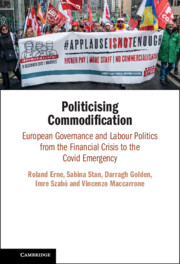Acknowledgements
This book is an outcome of our research project ‘Labour Politics and the EU’s New Economic Governance Regime’ (www.erc-europeanunions.eu/), which, since 2017, has received funding from the European Research Council (ERC) under the European Union’s Horizon 2020 research and innovation programme (grant agreement No 725240). We also acknowledge the funding from the Irish Higher Education Authority, which allowed us to extend our research when the Covid pandemic delayed our fieldwork. Moreover, we thank the Irish Research Council (IRC) for its Basic Research Excellence Recognition Award 2016 and a PhD scholarship grant (2016–2021); the University College Dublin (UCD) School of Business for funding our ERC research project manager; the UCD Geary Institute for Public Policy for providing us with a stimulating research environment and its facilities; UCD Research and the School of Business for seed funding; and Enterprise Ireland for its 2015 Proposal Preparation Support Scheme grant. We appreciate too the support from the European Trade Union Institute (grant No 2051-911-31), which allowed us to enhance our transnational socioeconomic protest database.
This book would not have seen the light of day without the generosity towards our work of numerous people whom we would like to sincerely thank. Above all, we are tremendously grateful to the many informants who talked to us despite their charged agendas: namely, German, Irish, Italian, Romanian, and EU-level trade union officials; national and European social movement activists; representatives of national and EU-level employers’ associations; national and European members of parliament; as well as officials from the European Commission, Council of the European Union, International Monetary Fund, and national governments.
Our research profited very much too from the support and feedback that we received from practitioners and researchers alike. We are very grateful to Maria Belizón, Anthony Brabazon, Máire Coyle, Orla Feely, Tom Gormley, Philip O’Connell, Michael O’Neill, Andrea Prothero, Bill Roche, and Tobias Theiler for their help in setting up our ERC research group. In October 2019, Stefano Bartolini, Dorothee Bohle, Lorenzo Cini, Mark Dawson, Adrienne Héritier, Brigid Laffan, Guglielmo Meardi, Devi Sacchetto, and Philippe Schmitter offered very helpful comments and suggestions at a dedicated project workshop held at the European University Institute in conjunction with the Scuola Normale Superiore in Florence. In June 2019, we discussed our research with German, Romanian, and European unionists at a fringe meeting at the 10th congress of the European Public Service Union (EPSU) in Dublin. In 2018 and 2019, we organised several UCD seminars with Nicolas Jabko, Christian Joerges, Alexandra Kaasch, Philippe Schmitter, and Martin Seeleib-Kaiser, who provided us with important insights for our research (www.erc-europeanunions.eu/events/). We also thank the discussants of the papers presenting our first research findings at subsequent workshops and international conferences (www.erc-europeanunions.eu/conference-presentations/) and the peer reviewers of ensuing journal articles and chapters (www.erc-europeanunions.eu/publications-1/).
Overall, we are especially indebted to the anonymous peer reviewers of this monograph and to the colleagues who carefully read one or several of its draft chapters, namely Andreas Bieler, Hervé Champin, Paul Copeland, Amandine Crespy, Colin Crouch, Gemma Gasseau, Elke Heins, Yves Hellendorff, Richard Hyman, Christian Joerges, Alkuin Kölliker, Kalle Kunkel, Imelda Maher, Paul Marginson, Silvia Rainone, and Felix Syrovatka. Nonetheless, the usual disclaimer about our responsibility for any omissions and mistakes applies.
Furthermore, we would like to pay thanks to our former IRC postdoctoral fellow Jamie Jordan and our former ERC postdoctoral fellow Jörg Nowak for their important contributions to our project (Jordan, Maccarrone, and Erne Reference Jordan, Maccarrone and Erne2021; Erne and Nowak, Reference Erne and Nowak2022). As visiting researchers, Ludwig Zurbriggen and Felix Syrovatka made notable contributions to our ERC research at its beginning and its conclusion, respectively. Our PhD students Mary Naughton and Costanza Galanti contributed a lot to the academic life of our group, while pursuing their own research questions, as warranted for doctoral students in the social sciences. Finally, we would like to extend our gratitude to our research project manager, Bianca Föhrer, whose support was crucial for both the successful operation of our ERC project in general and the submission of this monograph in particular. A very special note of thanks also goes to Catherine O’Dea for carefully proofreading the entire draft manuscript. Many thanks are also due to Ruth Martin for her professional indexing and to Trent Hancock for his editing work during the production process.
We are very grateful to Kenneth Armstrong for suggesting writing this monograph in the first place and to Finola O’Sullivan, Marianne Nield, Sharon McCann, and Gemma Smith from Cambridge University Press for their patience and support throughout its production. Last but not least, we thank our partners, families, and friends who supported us throughout the project’s journey.

